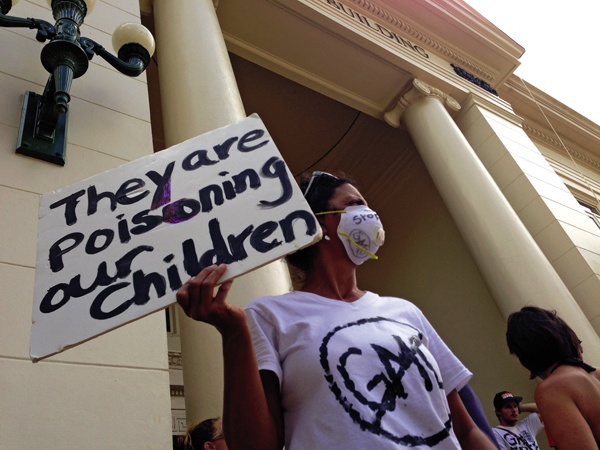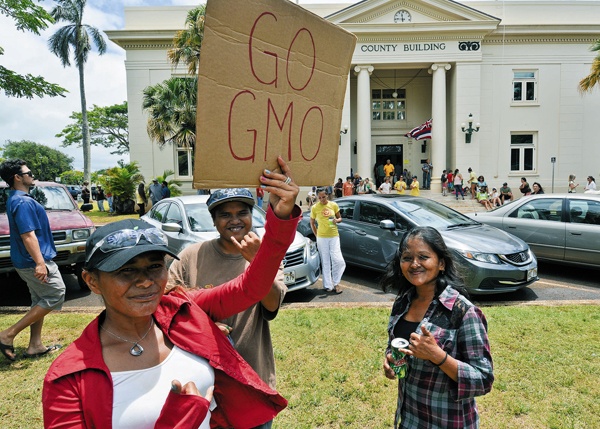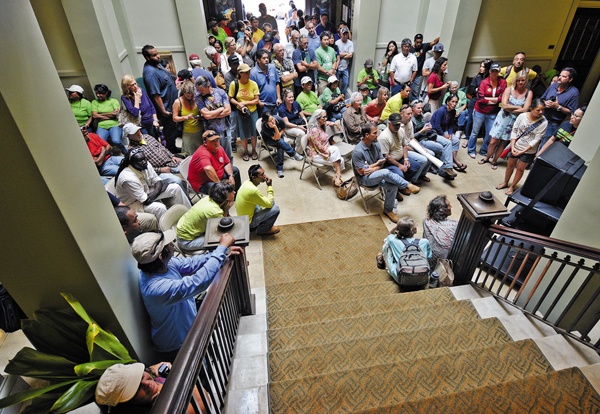GMO bill draws split crowd
LIHUE — A controversial bill proposing to regulate biotech companies on Kauai and demanding more transparency on pesticide use and the presence of genetically modified crops drew approximately 1,000 people to the Historic County Building Wednesday morning.
“This is clearly a very important issue that we’re dealing with,” said Kauai County Councilman Gary Hooser, who co-introduced Bill 2491 along with Councilman Tim Bynum.
In addition to establishing a 500-foot pesticide-free buffer zone around public areas and waterways, the bill would make it mandatory for large agricultural operations to make records of pesticide use available, ban open-air testing of experimental pesticides and crops, and place a moratorium on the commercial production of GMOs.
“We all like to believe the EPA protects us from pesticide harm, but sadly that is not always the case,” said Bill Freese, a science policy analyst at the Center for Food Safety.
Freese and William Steiner, the former dean of the College of Agriculture at the University of Hawaii, Hilo, briefed the council on potential dangers of the pesticide use and how other communities have responded to it.
The council chambers, with capacity for a little more than 100 people, wasn’t enough to house the crowd that came to hear or speak on the bill. Outside the chambers, council staff set up a small TV so more people could watch the meeting.
On the lawn in front of the county building, a much larger crowd gathered, representing both sides of the issue, with the scale tipping slightly to the four biotech companies on the island and Kauai Coffee — the companies that bought 99 percent of the 3.5 tons of restricted use pesticides sold on Kauai annually, according to documents obtained by Hooser.
Laurie Yoshida, of DuPont Pioneer, said the company gave the day off to those who wished to attend the meeting — and almost all 200 full-time employees showed up.
There were also hundreds of supporters or employees from Dow AgroSciences, Syngenta, BASF and Kauai Coffee. Yoshida said she estimated about 600 people in support of the seed companies attended the meeting.
“We are ag,” about 120 Pioneer employees chanted loudly as they posed for a group shot in front of the Historic Annex Building.
The anti-GMO crowd also came in large numbers, brought signs, public speakers and Hawaiian rights activist Walter Ritte, from Molokai, where the island’s largest employer is Monsanto.
Ritte said agricultural companies may provide jobs, but history shows they come and go, and cited the former sugar and pineapple industry, which are no longer in Hawaii and have left contaminated soil behind. He said if there is cost associated with enforcing regulations, Kauai should “make these guys pay.”
“I know you guys have not been conquered,” said Ritte, making a reference at King Kamehameha’s unsuccessful attempts to conquer Kauai more than 200 years ago.
Testimony
More than 100 people registered to speak, and each was allowed three minutes of testimony. With limited time available until the 12:30 p.m. lunch break, only eight people testified in the morning — five in support of the bill and three in opposition.
Bonnie Bator, of Anahola, discussed the high rates of asthma on Kauai’s Westside and said the 3.5 tons of restricted use pesticides used annually are contaminating the people and the land.
Lana Fujimori, an employee at Pioneer, said she strongly opposes the bill as it “unfairly confuses GMOs and pesticides,” puts her job and her family’s security in jeopardy, and is an attempt to wipe out agriculture on Kauai.
“I believe in our practices,” she said. “I believe in what we do.”
Taryn Dizon, a safety coordinator at Pioneer, said the local seed companies have invested an estimated $50 million on Kauai and employ approximately 600 people.
“As a result, the Westside has the lowest unemployment rate on the island,” she said.
Dizon added that she and other Westside residents chose to work in a business that supports agriculture for all of Kauai and develops technology for farmers to be successful and grow crops safely.
“In summary, I believe this is a waste of our tax money,” she said of the proposed bill.
Aloha Kaililoa, also an employee of DuPont Pioneer, addressed the council speaking only in Hawaiian. When Councilwoman JoAnn Yukimura asked Kaililoa for a short translation, she responded that she provided a written version to the council.
The most emotional testimony of the morning came from Wailua resident Sol Kahn, who broke into tears while speaking for the bill.
“This is destroying our island,” he said. “It’s killing the land, going into the water and the rivers. The reefs are dying. The turtles are dying.”
Kahn, who was born and raised on Kauai, said he fears the next generation won’t have an island left to enjoy.
“We don’t have time,” he said. “This isn’t something we can just talk about. … This is serious. We don’t have much time left. There’s a lot of poison being spread.”
Ritte’s testimony closed the morning portion of the meeting, and drew a long and loud ovation from the crowd watching the meeting.
“We’re very, very excited about what’s going on here,” he said. “I’m here to support you guys and say, ‘Don’t punt this thing.’”
Council Chair Jay Furfaro recessed the meeting at 12:30 p.m. After lunch, the council took other items on the agenda, and at 5:30 p.m., Bill 2491 was brought back for additional testimony and discussion.
Furfaro said if necessary, he would continue the meeting today, an option Deputy County Attorney Mauna Kea Trask said would be in compliance with the state Sunshine Law.
The decision to continue the hearing was not made by press time Wednesday.
Earlier in the day, Yukimura reminded the audience the council would not be making its final decision on the bill during Wednesday’s hearing, and that most bills pass their first reading.
“It’s only starting on its journey,” she said. “And the journey includes a public hearing.”
If the bill passes first reading, it will go through the council’s five-member Environmental Services Committee July 31. The committee is chaired by Councilman Mel Rapozo, with Councilman Ross Kagawa as vice chair, and the rest of the committee made up by Yukimura, Hooser and Bynum.
After the committee hears the bill, with the possibility of amendments, the full council would take the recommendations from the committee and make a final decision.
The bill
Hooser opened the discussion Wednesday by introducing the ordinance and explained state law not only allows the county to protect public health, but says it “shall” do just that.
“It’s about the right to know what pesticides, what genetically modified organisms, are being used in our community and what those impacts are,” he said. “I believe the people are entitled to know that. That’s really what we’re talking about.”
The bill has been reviewed or endorsed by a number of agencies, attorneys and groups, according to Hooser, including the Hawaii Teachers Association, Surfrider, the Sierra Club, the Office of the County Attorney, the Center for Food Safety, as well as attorneys from Earth Justice and the Native Hawaiian Legal Corporation.
“This thing has been reviewed, reviewed, reviewed,” he said.
Steiner said he came to present the council with facts about the biotech industry, as well as research papers to support those facts.
“The problem here, as it relates to soil and pesticides, is that chemicals like RoundUp, as we now know, kill soil and microorganisms,” he said.
The result is reduced fertility, and increased dependence on phosphates and, ultimately, poor soil left behind after the companies are gone, according to Steiner.
“How will Hawaii fare in the future with poor soils?” he said.
Freese addressed three specific issues during his presentation: The hazards of pesticide use; why Kauai cannot rely on the Environmental Protection Agency for protection; and how a few states and municipalities have responded to the deficiencies of EPA regulations.
Seven states have already established similar buffer zones requirements, some up to two miles, according to Freese.
On the Mainland, he said, corn usually produces one crop per year. In Hawaii, there can be two or three harvests annually, which means the seed companies use double or triple the amount of pesticides here, Freese said.
There are more experimental fields in the state of Hawaii — 740 fields — than in any other state, he said.
Peter Wiederoder, the Kauai site leader for Dow AgroSciences, said between 80 and 90 percent of the company’s employees showed up Wednesday to oppose to the legislation.
During lunch break, outside the council chambers, Wiederoder said if Bill 2491 passes in its current form, it would carry “a ton of weight.” He was especially concerned, he said, about the 500-foot pesticide-free buffer zones.
In his opening remarks, Hooser said the buffer zones would, without a doubt, be a contentious issue, but he believes they are important in order to protect human and environmental health.
Out of the 4,000 acres Dow farms, roughly 25 percent of it would be immediately lost by the proposed buffer zone, according to Wiederoder.
“We’re going to have to really evaluate if we can stay in business,” he said.
Hooser disagreed that the bill would eliminate jobs.
“Disclosing information does not cause a company to shut down,” he said. “Saying you can’t spray this stuff next to a school or hospital or a stream should not make a company close its doors and go away.”
Look for additional coverage of Bill 2491 in a future issue of The Garden Island.
• Léo Azambuja, staff writer, can be reached at 245-0452 or lazambuja@thegardenisland.com
• Chris D’Angelo, environment writer, can be reached at 245-0441 or cdangelo@thegardenisland.com.




